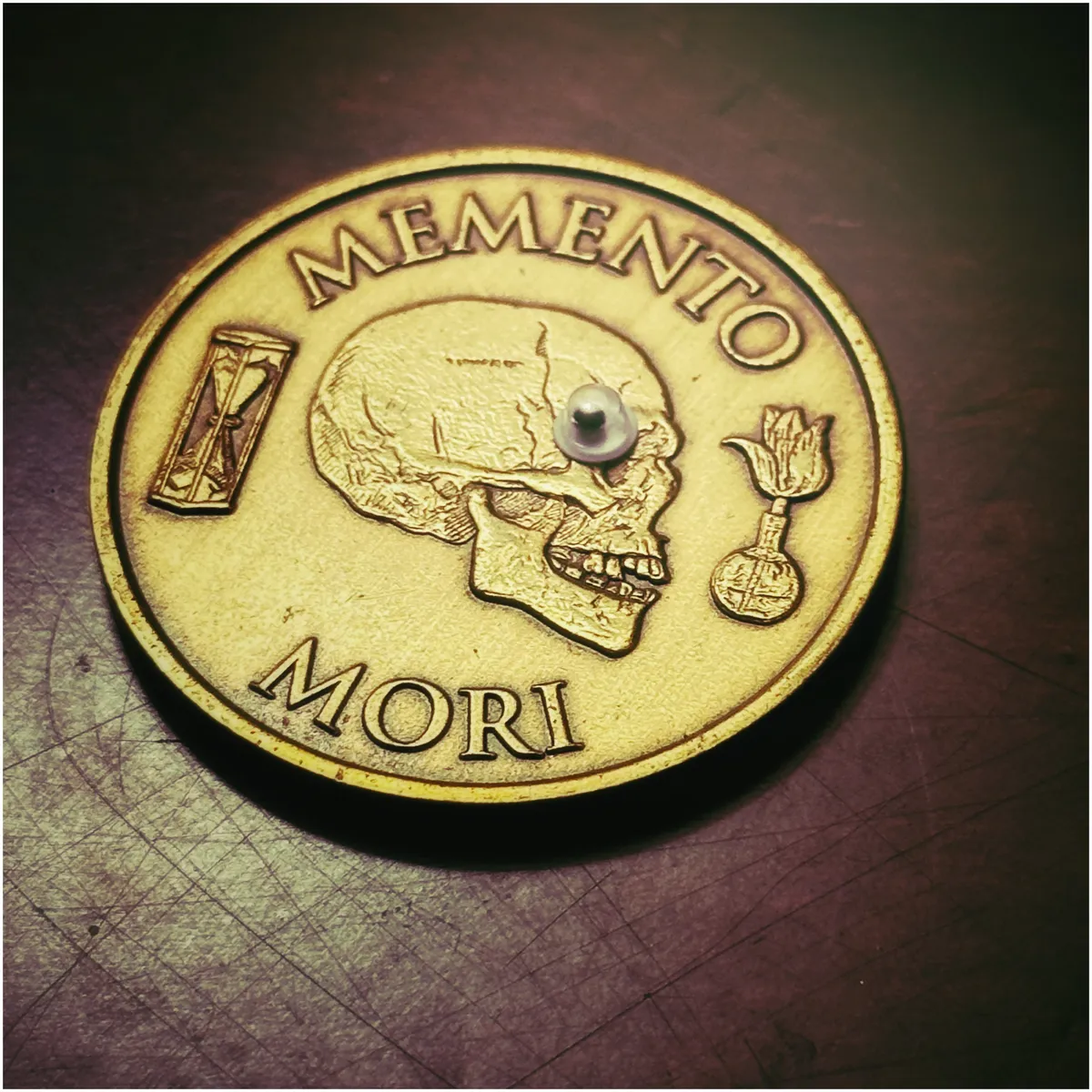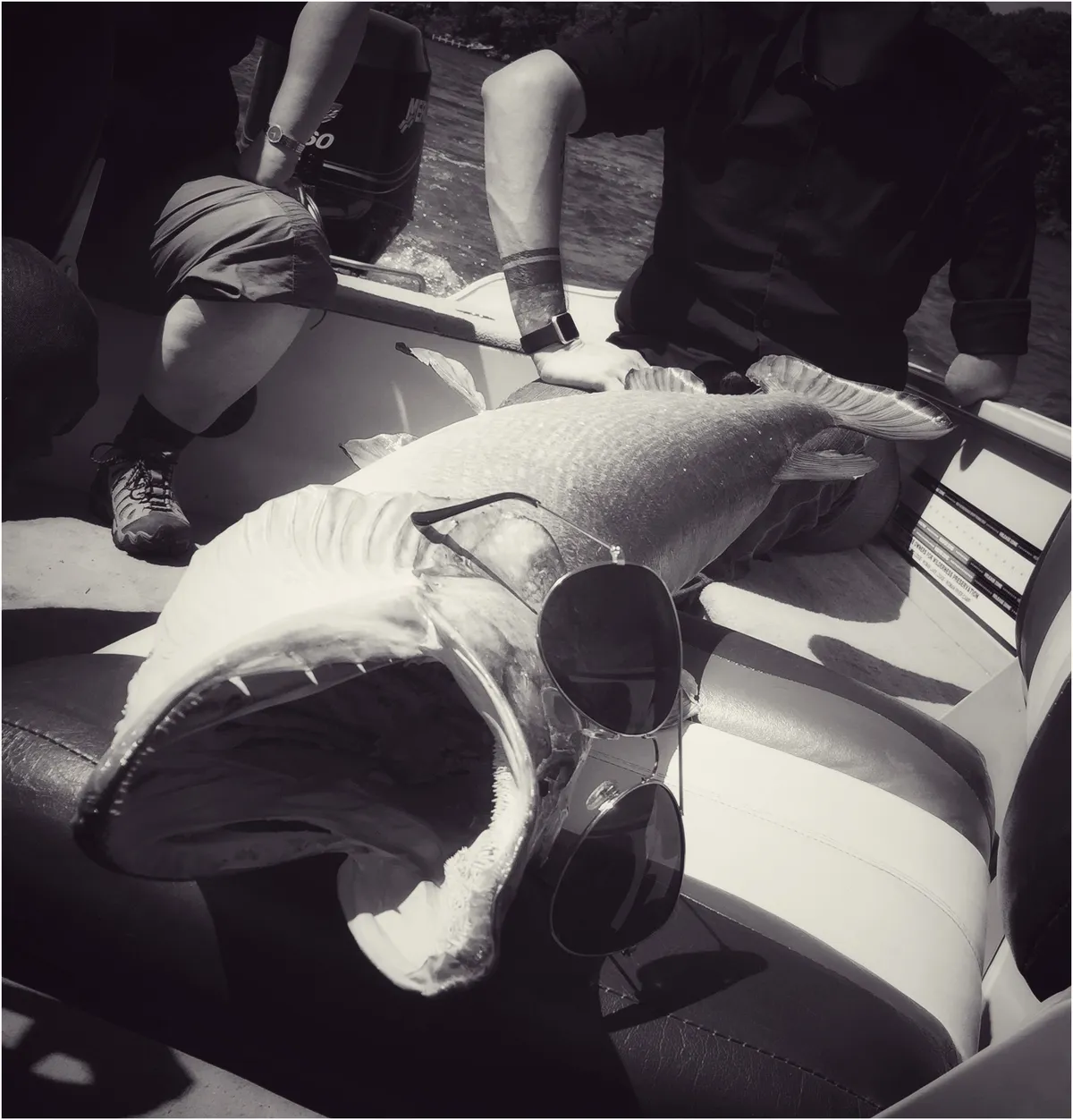All that remains is a stuffed fish - Blaugust the third
Preamble

Third post for Blaugust and already we veer into Heavy Stuffs. On my desk at home I have a series of medallions that I acquired during my Stoics phase. You know, that phase that every boy passes through where he wears togas and fake white beards all while shouting, fancifully, Latin phrases he doesn’t really grok. Of the four medallions, this one catches my eye most often:
Memento Mori
Remember that you will die
And not just because my wife put a googly eye on it.
It isn’t that you will but that you must
There is no choice about death. There is no judgment in it either. It simply is inevitable. Death is the gravitational singularity at the center of all things living—a cosmic obligation written into bone and breath.
A sidestep from passive into active
My sister said to me, late one evening, in an attempt to calm some anxiety I was having over dealing with death:
“The dead don’t know they’re dead.”
We were, at that moment, sitting in the hospital cafeteria while my father slept his way toward dissolution, one story above us. A week earlier he’d been admitted after a stroke—caused, we learned, by metastases that were sabotaging the coagulation of his blood. Stage 4 lung cancer. A quiet invasion. No one knew.
The anxiety I feel about death is weird to me when I hold it at arm’s length. I agree with her statement. The dead lack awareness because they lack the architecture of mind. A non-working mind cannot perceive itself. No life, no consciousness. No I. But like… that doesn’t help.
I bristle at the idea of passivity toward passing. “The dead don’t know they’re dead” becomes a kind of semantic satiation—a mantra that dulls the edges through repetition. As though if said enough, death becomes mere syntax.
The three deaths
I’m not even necessarily afraid of dying, as a verb. That moment when the machine ceases to whir—the first death. Yes, that’s a reality I understand. We’ve all been ushered into its periphery through pets, friends, family.
There’s a threshold—a breath, a beat, a blink—and then there isn’t. A person shaped absence. A mechanical void.
Memento Mori
The circumstances around his stay were not ideal, but he ultimately passed as he lived—snoring like a buzzsaw. It was my first time being near the process. I won’t get into it, but there was a kind of quiet, clinical fascination. The body in its final hours becomes a ghost ship on autopilot. His snoring was no longer his—it was the medulla, clinging to routine.
That’s the first death. A biological expiration. A switch, flicked. Lights out.
Memento eum mortuum esse
Ritual makes the moment tangible. Holding a bag of ash isn’t power, but it is weight.
Memento eum mortuum esse
Remember that he has died.
He wanted to be scattered into water—practical prose, no poetry unless it was about love or family. That moment—my observation of his death—marks the second death. The moment where memory takes over where flesh once was. When I poured his ashes into the lake of his childhood summers, the idea of him drifted further than the particles could carry.
I keep his blackbelt, a cigar box of postcards, the monstrous pike1 caught by his father in the same lake. These objects have gravity. They bend memory around them.
But the man? He flickers now only in ephemera. He persists in relics and recall, but not in presence.
Memento eum non memoria ductum iri
And then comes the third death. The one I fear most: being forgotten.
Memento eum non memoria ductum iri
Remember that he will not be remembered.
This is where the bones of anxiety truly rattle. Eventually, the last person who remembers you will also be gone. When their synapses stop firing, so does your shadow.
My obsession with productivity—written about before—was probably just a fevered attempt to leave behind something. I’ve amassed shelves of journals and art and Objects Of Me that… will outlast me, maybe, but not necessarily find a home.
No children. No living legacy. My cats are terrible archivists.
The negotiation of Physical vs Emotional remembrance
I think I undervalue love. I distrust care. Too many childhood friendships imploded like dying stars—burning out, leaving radiation behind. Even now, decades later, I keep a suspicious distance from the people who are good to me.
I have great people. But I tend to measure my life in outputs. In things I’ve made. Contributions I’ve etched into the indifferent walls of a society that doesn’t particularly care for a disabled guy constantly reminding developers to make software usable by blind folks.
Somewhere, I know that without a caretaker, even relics decay. Art isn’t legacy without memory. And memory is not immortal.
Immortality is a theater of mirrors, sustained only by the eyes that look in.
This is just to say
I have created the art in the studio
which I have been saving for you.
Forgive me—
I have not called you.
So dark
and neglectful.
The effort poured into physical tokens doesn’t amount to much if no one remains to carry you. The idea that I will be forgotten—accurately put—may have fueled all this creating. But I’m starting to think it misses the point.
The people who are here now—fragile, beautiful, ephemeral—matter more than the fish-staring moments I use to conjure phantoms of the past.
Writing (which I love) may not grant permanence. A generation from now, these words may be dust. But the act of writing today, and what it brings to this day, is enough.
I have this coin—etched with the reminder—and I carry it.
Not as a novelty. Nor as a talisman.
But as a quiet, weighted whisper:
To remember is not to be reminded— it is to carry death in your pocket.
Footnotes

We absolutely brought the fish with us when we spread his ashes...↩